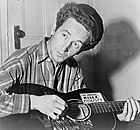Portal:Oklahoma/Selected article/July, 2007
Woodrow Wilson Guthrie (July 14, 1912–October 3, 1967) was a prolific American folk musician. He described himself in one of his songs as "The Great Historical Bum",[1] a first hand observer and survivor of the economic and environmental hardships of the dust bowl, which shook the great plains states during the great depression. Guthrie's body of music consists of hundreds of songs, ballads and improvised works. The breadth of his song topics ranged from political and traditional songs to children's songs. Guthrie performed constantly throughout his life; his guitar frequently sported the slogan "This Machine Kills Fascists". He is perhaps best known for his song "This Land Is Your Land". Many of his songs are archived in recordings in the Library of Congress and some such as "This Land" are regularly sung in US schools. He occasionally had regular radio shows and was a founding member of The Almanac Singers.
Woody Guthrie traveled across the USA many times and spent much of his time on early trips learning traditional folk and blues songs and creating new American folk songs of working people. His travels frequently followed the movement of migrant workers across the great plains and in California. He was associated with and regularly performed for, but was never a member of, several communist groups in the US throughout his life.[2] He had a great many odd jobs including sign painter, radio host, fruit picker, sailor, dish-washer, and soldier in the US army.
He fathered eight children from his three wives including American folk musician Arlo Guthrie and is the grandfather of musician Sarah Lee Guthrie. Later in life, he developed symptoms of the degenerative neurologic affliction, Huntington's disease. Like his mother, he eventually died from complications of this fatal congenital disease. In spite of his illness, during his later years, he served as a figurehead in the folk movement providing inspiration to a generation of new folk musicians, including mentor relationships with Bob Dylan and Ramblin' Jack Elliot.[3]
References[edit]
- ^ Klein, Joe (1980). "Woody Guthrie: A Life". Random House. p. 204. ISBN 0385333854.
- ^ http://www.loyno.edu/history/journal/1996-7/Spivey.html, [1]
- ^ Reitwiesner, William Addams. "Guthrie Family Ancestry". Retrieved 2007-04-10.

